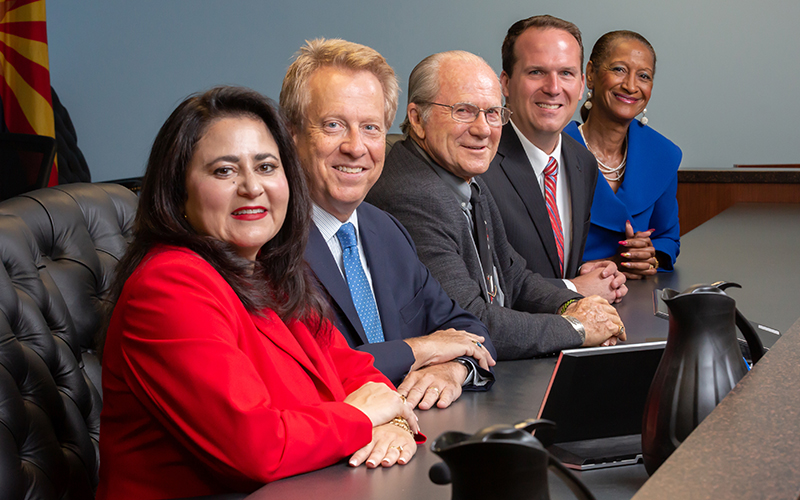
The current Arizona Corporation Commission is, from left, Lea Márquez Peterson, Boyd Dunn, Bob Burns, Justin Olson and Sandra Kennedy. Two Republicans and a Democrat this week appeared to be close to securing three open seats, according to the Arizona Secretary of State’s Office. (Photo courtesy of the Arizona Corporation Commission)
PHOENIX – Two Republicans and a Democrat were leading in the race to secure three of the five seats on the Arizona Corporation Commission, which regulates publicly owned utilities in a state that faces growing challenges from the effects of climate change.
Unofficial results from the Secretary of State’s Office on Friday morning showed Republican Lea Márquez Peterson, Democrat Anna Tovar and Republican Jim O’Connor were leading in the six-way race, but hundreds of thousands of votes still have to be counted. About 50,000 votes separated the third and fourth-place positions Friday morning.
The commission is facing issues involving renewable energy and rate hike cases, such as one proposed by APS last year that would raise rates 3% to 6% for the majority of its 2.7 million customers.
One of the upcoming decisions the commission will face is a vote on a bipartisan package that would require utilities to be 100% carbon free by 2050. The guidelines would replace the Renewable Energy Standard and Tariff, approved in 2006, which requires utilities to get 15% of their power from renewable sources by 2025.
The commission’s proposal has benchmarks, including meeting a 50% renewable energy standard by 2035. The benchmarks would “ensure utilities cannot shelve their clean energy plans for decades before putting them into action,” according to the language in the proposal.
Arizona Public Service, the state’s largest provider of electricity, has outlined a plan to bring 100% carbon-free energy to its customers by 2050, but that plan includes nuclear power.
“We’re in the middle of really debating Arizona’s future energy goals,” said Marquez Peterson, who was appointed to the commission in 2019 to replace Andy Tobin. “Depending on who that third person is could change the dynamic.”
The commission, which also oversees the incorporation of businesses, securities regulation and railroad and pipeline safety, hears 70 to 80 rate cases a year, Márquez Peterson said, and the new commissioners are likely to have a big impact on how those cases are decided.
“We’re only five on this commission,” she said. “Three votes makes an incredible difference, so whoever ends up with these seats we absolutely need to be working closely together.”
Arizona is one of just seven states with constitutionally mandated commissions to oversee utility regulations. Arizona is one of only 13 states that elect commissioners; in the rest, commissioners are appointed by the governor or legislature.
Six candidates ran for three seats, all of which were held by Republicans. Tovar has the potential to change that if she joins Democrat Sandra Kennedy on the commission.
Here is what you need to know about the candidates:
Anna Tovar
Tovar is mayor of Tolleson, which is west of Phoenix, and a former teacher and state legislator.
Her first priority as a commissioner, she said, would be to be a voice for Arizona families.
“I don’t have an issue asking the tough questions and making sure my priority is putting Arizonans first,” Tovar told Cronkite News. She wants to be on the commission because Arizona must move forward with renewable energy and creating clean jobs. But she also wants to make sure utility costs don’t prevent lower-income communities from utilizing renewable energy.
While campaigning across Arizona before the pandemic, Tovar said, she was surprised by how few people even knew the commission existed.
“It is one of the most powerful entities here in the state that people know very little about,” she said. “For me, I want to make sure that I am restoring trust and accountability to the commission, expanding on our renewable energy.”
The commission in recent years has been dogged by controversy over “dark money,” which is widely criticized but not illegal in Arizona. In 2014, APS funneled more than $3 million to third parties in support of its favored candidates for the commission, according to the Associated Press. The company didn’t publicly acknowledge that spending until four years later. AP reported that in 2016 APS openly spent $4 million on the commission races and nearly $40 million to fight a 2018 citizen’s initiative that would have required utility companies to get more of their power from renewable sources.
In January, APS said it would not spend money to influence Corporation Commission races.
Lea Márquez Peterson
Márquez Peterson is the former president and CEO of the Tucson Hispanic Chamber of Commerce.
Márquez Peterson said she supports Arizona’s transition toward renewable energy, saying it is “only a matter of time” before the entire nation works toward that transition, and supporting Arizona’s renewable energy sources would make the state competitive.
But it also is important that there be a balance between ensuring appropriate capital investments for companies and maintaining reliable services for ratepayers, she said. The financial burden from COVID-19 on customers impacts her decisions when it comes to rate cases, she said.
Márquez Peterson said she is feeling “very optimistic” about her chances to stay on the commission.
Jim O’Connor
O’Connor, a former registered securities adviser, wants to make sure regulations are enforced to keep ratepayers from being fleeced.
“Bad behavior only stops when the bad actors pay very heavy consequences,” O’Connor said, referring to governments and companies that take advantage of ratepayers.
As for renewable energy, O’Connor told Cronkite News last month, “It feels like everybody’s on the same page for clean, for renewable, without government mandating it, without a forced push, and that’s an important thing, at least from my standpoint.”
O’Connor said his main goal is to keep “monopoly” water and power rates reliable, safe and affordable.
William “Bill” Mundell
Mundell is a lawyer, former judge and legislator, and he was a commission member from 1999 to 2008, including two years as chairman. He helped write the commission’s current renewable-energy guidelines, which were adopted in 2006.
Mundell hopes to make Arizona the solar capital of the world. His main goal was to protect the environment, particularly when it comes to water supply.
“Whether it comes to making sure we have water sustainability, clean and adequate water for our grandkids, our great-grandkids and future generations, water is a very important issue facing the state of Arizona,” Mundell previously told Cronkite News.
Eric Sloan
Sloan, who owns an economic development firm, said he wants a “fair deal” for Arizona ratepayers.
Sloan last month told Cronkite News he wanted to make sure the money Arizonans paid for companies to switch to renewable energy gets returned to them.
He recognized the financial burden COVID-19 has had on people and said the greatest issue the commission faces is eliminating peak rates for electricity.
Shea Stanfield
Stanfield is a teacher, land preservationist and former Cave Creek Town Council member.
She supports the Green New Deal and said switching to renewable energy needs to be incentivized to reach renewable energy goals.
She said corporation corruption is the biggest issue being faced in the current election, and that the interests of the people should come first when it comes to rate hike cases presented to the commission.
 Want more on the 2020 elections? Cronkite News, Arizona PBS and Indian Country Today have teamed up to bring you comprehensive election coverage. Click here for more.
Want more on the 2020 elections? Cronkite News, Arizona PBS and Indian Country Today have teamed up to bring you comprehensive election coverage. Click here for more.

